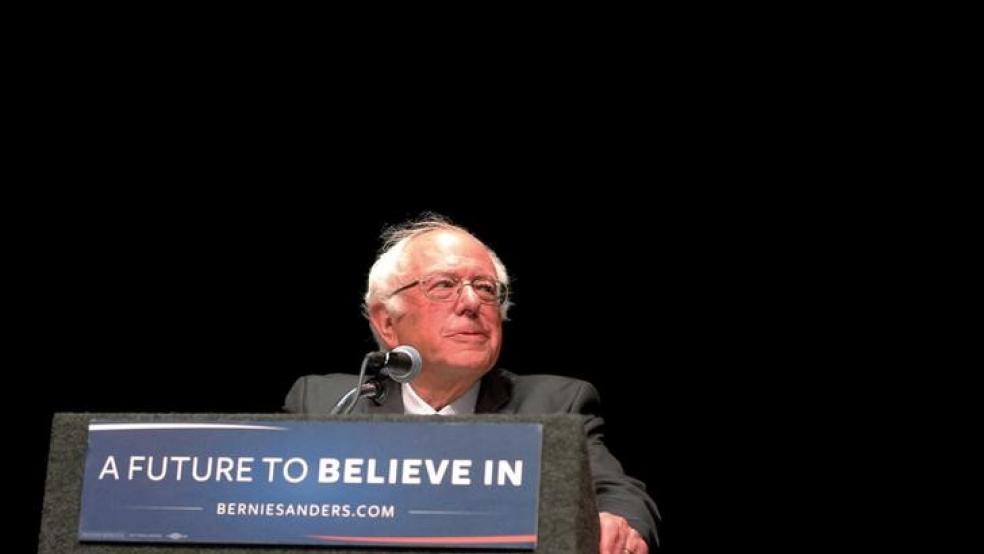Days after Bernie Sanders (I-VT) linked climate change to the spread of terror groups like ISIS, the Democratic presidential contender has advanced another unconventional idea: that the U.S. put together a new international organization, similar to NATO but including Russia and Arab League countries, with a mission of defeating extremists.
“We must create an organization like NATO to confront the security threats of the 21st century — an organization that emphasizes cooperation and collaboration to defeat the rise of violent extremism and importantly, to address the root causes underlying these brutal acts,” he said Thursday in a speech at Georgetown University in Washington, D.C.
Related: Clinton Distances Herself from Obama in the Fight Against ISIS
The speech was billed as an explanation of the Vermont senator’s brand of Democratic socialism, but it also offered Sanders an opportunity to discuss his views on foreign policy, an area where he’s considered a novice compared to his presidential rival, former Secretary of State Hillary Clinton.
The perceived lack of foreign policy bona fides was on display at the beginning of last week’s Democratic presidential debate, when Sanders was pressed if he still believed climate change posed the greatest threat to national security.
“Absolutely,” he replied. “In fact, climate change is directly related to the growth of terrorism.”
The comments, coming one day after the ISIS attacks in Paris that killed at least 129 people, have become a lightning rod for GOP criticism, with top Senate Republicans calling them everything from “disingenuous” to “absurd.” Others, while stopping well short of claiming a “direct” link between climate change and terrorism, have defended the idea that drought conditions in Syria may have contributed to instability in the region.
Related: From Bombers to Subs, Inside Bush’s Costly Plan to Expand the Military
Sanders’ latest proposal might also draw some head-scratching. NATO was started in the early days of the Cold War and grew to become a major bulwark against the then-Soviet Union. The fate, and the very relevance, of the 28-member alliance has become a hotly debated topic in the face of Russia’s annexation of Crimea last year, its support for separatists in eastern Ukraine and its provocative actions around the globe, such as having military aircraft enter the airspace of several NATO member nations.
But others have echoed, in a way, Sanders’ call for a new coalition focused on ISIS. Russia riled the global security order in September when it deployed weapons and personnel to Syria prop up the Assad regime, though the Kremlin maintains its forces are there to battle ISIS. Moscow and Washington eventually worked out a way to carry out their disparate bombing campaigns, but questions about increased coordination have arisen after ISIS bombed a Russian airliner in Egypt. The French government, enraged over last week’s attacks, has launched waves of airstrikes on the ISIS stronghold of Raqqa in Syria and struck an agreement to work together with Moscow.
While the White House has flatly ruled out enhanced coordination — stating that Russia wants to keep Assad in power, a no-go for the administration — some in President Obama’s own party have signaled an openness to the idea.
“They are starting a new initiative against ISIL in Iraq and Syria. That is a step forward. And I think it's the beginning of a joint global effort — the United States, its NATO allies, Russia, other countries — to try to destroy this base of operations of ISIL,” Senate Minority Whip Dick Durbin (D-IL) said Tuesday during a news conference.
Sen. Dianne Feinstein (CA), the top Democrat on the Senate Intelligence Committee, also believes the U.S. should stop ignoring Russia’s interests in the region.
Related: Can ISIS Save the Russian Economy for Putin?
"We need to be able to work with Russia and Iran, if they will work with us, in the Syria area. We need to be able to get a political solution to Assad so that all of everyone's attention can be directed to ISIL,” she told MSNBC's Andrea Mitchell on Monday. “We're going to have to look at some new teams — new themes — and I think we will have to listen very carefully to our military people and ask for the kind of precise military strategy and tactics that might be able to really contain ISIL and defeat it.”
Aside from floating a new alliance, Sanders largely stuck to his previous stances, criticizing America’s allies in the Middle East, who he argues “have contributed far too little in the fight against ISIS.”
“All of this has got to change. Wealthy and powerful Muslim nations in the region can no longer sit on the sidelines and expect the United States to do their work for them,” he said.
Sanders said the war with the terror organization, which released videos this week that threatened attacks in Washington and New York, “must be done primarily by Muslim nations with the strong support of their global partners.”
In that way, his anti-ISIS policy resembles Clinton’s. Earlier on Thursday she outlined her strategy for defeating the group, one that requires allies in the region, like the Arabs and Turks, to “step up” their contribution against the group.





